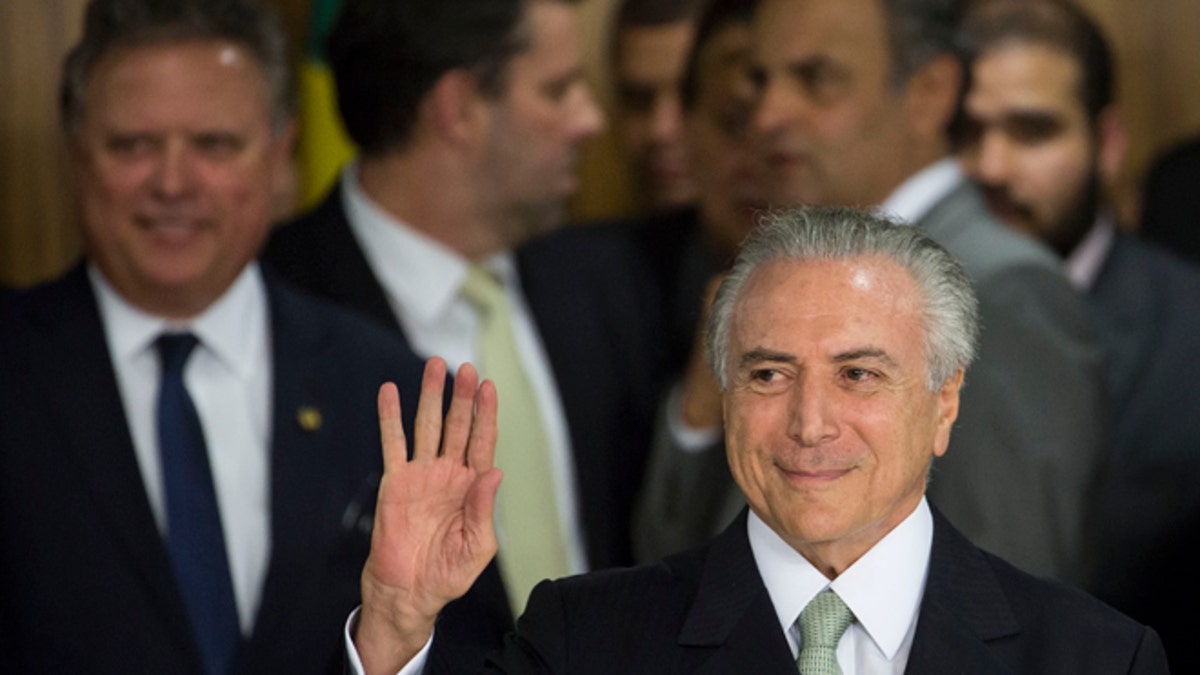
Brazil's acting President Michel Temer at Planalto in Brasilia, Brazil, Thursday, May 12, 2016. (ap)
Brasilia, Brazil – Michel Temer had barely stepped into President Dilma Roussef's shoes when the complaints started flying.
The former vice president of Brazil, the country’s head of state for at least the next 180 days, came under fire just a few hours after taking office when he named his new cabinet: a lot of older white men, and not a single woman or Afro-Brazilian.
Jandira Feghali, a congresswoman and a Rousseff ally, said the outcry is justified. "There’s no doubt that the agenda for women is going backward,” she told Fox News Latino. “This government is a blow to democracy. With this, it’s clear women will have no place in it."
Among the ministers sworn in Thursday afternoon were Henrique Meirelles (Finance), Romero Jucá (Planning), Eliseu Padilha (Chief of Staff), Geddel Vieira Lima (Secretariat of Government) and José Serra (Foreign Affairs) – many of whom also held cabinet posts under Rousseff.
At the time of her impeachment, there were four women in cabinet-level posts – none of whom have been invited back: Katia Abreu (Agriculture), Tereza Campello (Social Development), Nilma Lino Gomes (Human Rights) and Izabella Teixeira (Environment).
There was bound to be some backlash against Temer, given the bruising political fight that led to the Thursday morning Senate vote to impeach Rousseff.
But for scholars and the country’s feminists, his cabinet choices seemed almost personal. They believe he purposely omitted women to signal his break from the country's first female president, a woman who was imprisoned and tortured during the country’s military dictatorship.
This is the first time that the government has not had a woman in a high-ranking government post since the Gen. Ernesto Geisel was in office in the late 1970s.
Rousseff is now officially removed from the government for six months while the impeachment process heads to the courts.
Temer did invite a woman to head up the Human Rights department, but nothing was finalized, and the position is normally part of the Ministry of Justice, which is being headed by Alexandre de Moraes.
The former Minister of the Supreme Court, Ellen Gracie, was considered for Comtroller General, but declined the invitation, according to the newspaper Folha de São Paulo.
In excluding women from the team, Temer is reflecting a deeper truth about Brazilian politics that was harder to accept with Rousseff as head of state.
According to the Inter-Parliamentary Union (IPU), Brazil ranks 115th place among 190 countries in terms of women's presence in parliament.
In the House of Representatives, they hold only 51 of the 513 seats. Representation is a bit better in the Senate, where 13 of the 81 members are women.
The U.N. representative for women in Brazil, Nadine Gasman, said that the ability for women to decisions of power in the country's decision-making process is a good measure of the health of a democracy.
"Anything that stands against the development of women's leadership and role in decision making can be characterized as discrimination," she said. "The United Nations is working and relying on its member states, such as Brazil, to ensure that gender equality is guaranteed at all policy levels of management to address historical inequalities based on sexism, racism and ethnocentrism."
A former Minister of Human Rights during Rousseff's first term who is now a deputy in the Congress, Maria do Rosário, also criticized the absence of women on the team.
"This only reinforces the illegitimacy of this government," she told FNL. "But I still believe [Temer] will try to change it, because it's the sort of thing that tends to rebound badly on you in public opinion. But the initial impulse, not to include any woman, indicates that they consider our place as women not as decision makers.”
It would seem to be part of how Temer, a lawyer and a career politician, wants people to see him outside of politics too. According to the New York Times, a recent profile of him in the Brazilian magazine, Veja, depicted his 32-year-old wife, Marcela, as “pretty, demure and of the home.”
"We have a population that is more than half women, and it is inconceivable that they have no representation in this government," Katerine Oliveira, who works for the feminist group Olga Benário Movement, told FNL. "In many sectors of the country, we see the rise of women – in the number of graduates from universities, even in traditionally male professions such as engineering.”
She added, “Now we have a greater challenge, that is to be vigilant and defend our rights."
The feminist scholar Marcia Tiburi was blunter. "The ministers of this narrow-minded, fascist and outdated coup are a very clear sign of who this government is going to serve for the next six months," she told FNL. "There will be 180 days of living in a desert of women’s rights."
